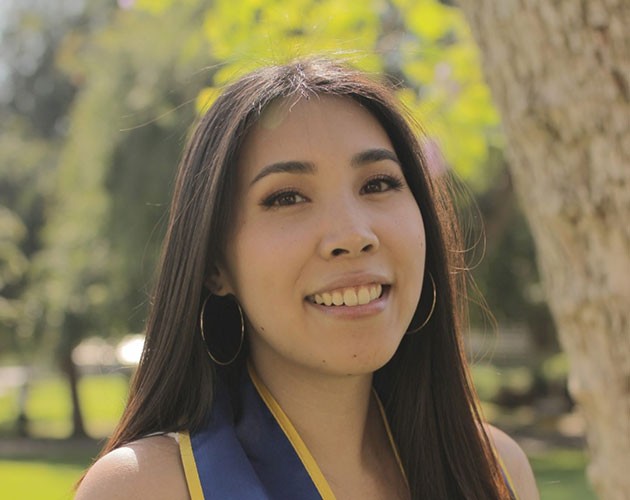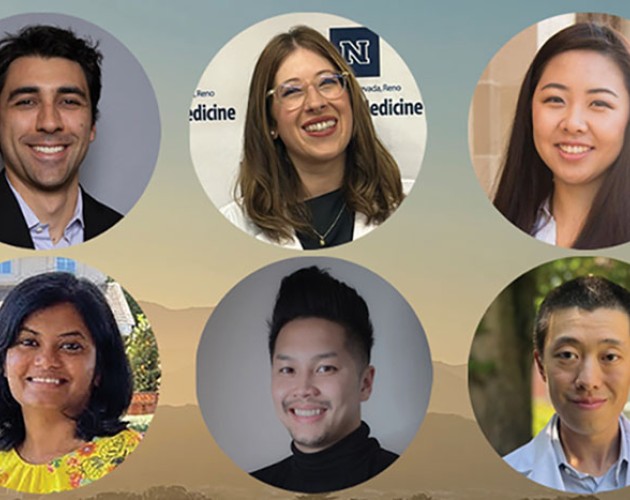A Vision for Providing Optometric Health Care

When you trust in yourself and your strengths to take your future one step at a time, things tend to work out as they are meant to be. Such is the case for Post-Baccalaureate Health Professions Program alumna Kim Nguyen.
By concurrently taking high school and college courses through a program at Evergreen Valley College (EVC) in her hometown of San José, Calif., Kim was able to explore career options and build connections early on. She also discovered an interest in psychology and decided to pursue an associate’s degree in the field. Kim then transferred to San José State University (SJSU) to complete her undergraduate degree in psychology—even though she was still uncertain what her actual career would be.
These were just the first steps in what is turning out to be a greater vision.
“Halfway through my time at SJSU, I discovered my passion for optometry,” Kim says.
As an only child of Vietnamese immigrant parents, Kim’s childhood inspired many of her career aspirations and awakened the desire to help those around her overcome challenges she witnessed. “Growing up in a community of predominantly Asian immigrants, I recognized the distrust between families and the Western health care system,” she explains.
“Right before the pandemic hit, I was in search of a job—any job, really. I stumbled upon an optometry office job and applied on a whim, even though I had no experience working in a health care office,” she says. “Seeing the impact that the doctors in our office had on our patients’ overall wellbeing, I was inspired to begin my career journey in optometry, hoping to focus on cultural understanding and patient-centered care.”
While pursuing her psychology degree at SJSU, Kim joined the Pre-Optometric Association there that affirmed her current career path.
“Joining the Pre-Optometric Association at SJSU gave me the opportunity to further explore my interests in optometry, connect with working optometrists and bond with pre-optometry peers,” she reflects. “I enjoyed learning about psychology during class time while exploring optometry during my extracurricular activities.
“After being a member of the pre-optometric association for a semester, I applied to be the club ambassador, and the following semester I became the vice president of the club. This experience allowed me to network with so many people! From private-practice owners to optometry school admissions committees and pre-health students, I was able to learn about their experiences, gain mentorship and stay up-to-date with advancements in the field.”
But even after graduating from SJSU, Kim needed additional help in order to reach her career goal: Our Post-Baccalaureate Health Professions Program allowed her to fulfill the prerequisites for graduate school applications.
A Career Changer
Kim’s psychology degree left her with a good amount of prerequisites left to take for optometry school. While still working part time at a corporate optometry office as an optometric technician and patient care coordinator, she chose our post-bacc program for its individualized approach to helping students achieve their personal academic goals.
“I was considered a ‘career changer,’” Kim says. “I wanted extra guidance from advisers who had an extensive amount of knowledge about applying to allied health graduate schools. This was my priority when deciding to apply to the program. I also appreciated how easy it was to enroll in the classes I needed due to having priority enrollment.”
Visualizing Her Course Schedule
- Health Careers Seminar I
- General Biology I
- General Biology Laboratory I
- General Chemistry I
- General Chemistry Laboratory I
- Health Careers Seminar II: The Application Process
- General Biology II
- General Biology Laboratory II
- General Human Anatomy
- Introduction to Human Physiology
- Health Careers Seminar II: Developing Your Personal Statement
- Health Careers Seminar II: Interviewing Successfully
- Biochemistry
- Medical Microbiology
Starting the post-bacc health program in 2022 and completing it by the end of 2023, Kim was able to take all of her necessary courses in person, with the exception of the three health career seminars, which are offered in the online format. Because of the personalized nature of our program, she also found that staff, instructors and fellow classmates all made a positive impact on her experience.
“Being in the post-bacc program, I enjoyed learning from instructors who have real-world experiences in health care,” she says. “Dr. Rosemary Hardin, who taught Introduction to Human Physiology, and Dr. Ying Liu, who taught General Biology Laboratory l, both made an impact on my academic journey.
“Dr. Hardin’s class consisted of homework and exams based on her lectures. Though physiology is a very content-heavy class, Dr. Hardin made the concepts easy to understand and always encouraged questions. Due to her former experience as a physician, she was able to relate her personal stories to the lectures, making the course much more memorable.
“Dr. Liu’s biology laboratory course focused heavily on group work, data analysis and hands-on experiments. I appreciated her efforts in making the class extremely interactive by using Kahoots and choosing creative experiments.”
Kim also leaned on her network of fellow students as she progressed through the program, giving her career perspectives from different stages and professional backgrounds.
“I was fortunate to have met some of my closest friends during my first semester in the post-bacc program,” Kim imparts. “Though the majority of my peers were pre-med students, I was intrigued to learn about the different specialties that they were interested in. I was also able to get advice for the classes I planned to take as many of us had taken similar prerequisites at some point in time.”
The experience led to an enhanced camaraderie: “When the time came to apply to medical and allied health graduate schools, we spent time working on our applications together—proofreading each other’s essays and encouraging one another. It was easy to connect with like-minded peers in the program as everyone shared similar aspirations.”
Guiding Steps for Professional Growth
“Department director Dr. GuhaMajumdar and academic adviser Pauline Alnajjar were extremely helpful before and during the application process,” Kim praises.
“Throughout the program, they checked in with students to ensure that we were taking the correct courses and reviewed our résumés to help us become strong applicants. They also took the time to thoroughly review my application before submission, ensuring that I was sending in my best work. I especially enjoyed the health career seminars they hosted as I was able to gain insight and inspiration from fellow pre-health students.”
Now, Kim is set to begin her graduate program in optometry at the UC Berkeley Herbert Wertheim School of Optometry & Vision Science.
And even though she is no longer considering a career in psychology, her undergrad education will undoubtedly add value to and enrich her health care career. Circling back on an earlier comment, Kim’s goal is to bring cultural competence to health care and meet the needs of the community.
“Studying psychology did not help fill the prerequisites for optometry school, but it has helped me grow individually and it will continue to help me become an excellent provider,” she says. “I can use my understanding of human behavior and biases to use an interdisciplinary approach, providing holistic and quality care.
“Upon graduation from UC Berkeley, I would love to open up my own practice—specifically, in the Bay Area. I want to be able to incorporate my own ideas of quality patient care while serving the community that I grew up in.”
For career changers considering our Post-Baccalaureate Health Professions Program to achieve their health care career goals, she has this advice: “Make the best out of it!
“Truly take advantage of what the program has to offer and don’t shy away from building connections. The program staff, your instructors and peers are all extremely supportive. During your time in the program, you will learn about many upcoming health care–related opportunities—from jobs, volunteer experiences, research, webinars and more. Just by talking to people and putting yourself out there, academic-enhancing experiences become so accessible.”
Of course, life-enriching experiences aren’t only found in the classroom.
“On a side note,” Kim adds, “if you have the opportunity to take classes in person, I recommend taking the time to also explore Berkeley as a city. Check out UC Berkeley’s campus—I love the Memorial Glade and the Doe Library! I also enjoy the many cafes around the area, such as The Hidden Cafe and 1951 Coffee Company.”


